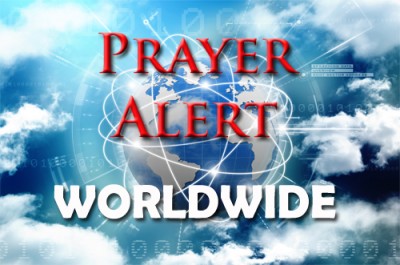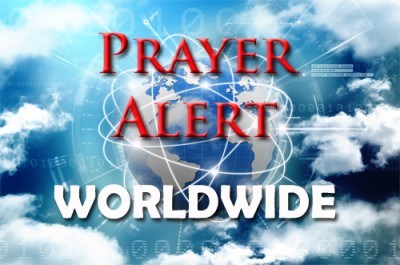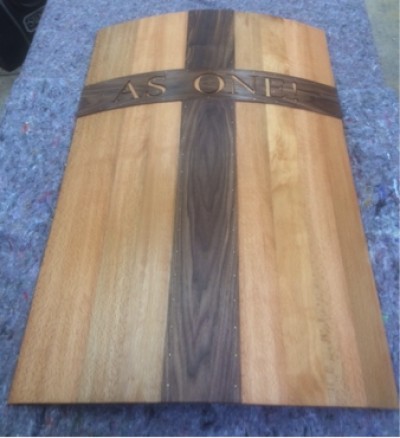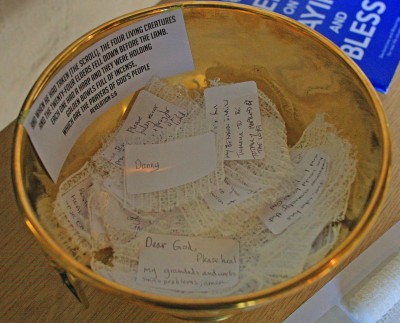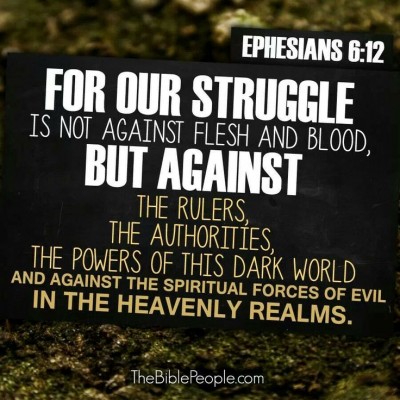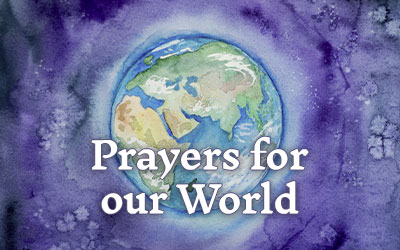Israel and the WCC
03 Jun 2016The World Council of Churches is still complaining about the interrogation and treatment of its staff and professional colleagues at Ben Gurion International Airport a month ago. Some were interrogated repeatedly for up to eight hours, and Israeli officials accused them of arriving for an entirely different reason than for their stated purpose: a meeting on climate change hosted by member churches in the region. They were threatened with a ten-year ban on entry to Israel and being listed on Interpol watch lists; then they were detained in prison-like conditions for up to three nights before being deported. Many of the participants in the working group meeting had little or no previous experience of visiting Israel and the Occupied Palestinian Territories. In the light of this intimidating and traumatic experience, the WCC is carefully reviewing its procedures and advice to participants in such ecumenical visits and meetings, to eliminate ambiguities and to avoid misunderstandings. Pray for peace and justice for all people in the region.
South Sudan leaders discuss peace agreement
03 Jun 2016For the first time since the formation of a transitional government of national unity on 29 April, the South Sudan leaders have met to review the implementation of the August 2015 peace deal. On Tuesday in Juba, President Salva Kiir and his first and second deputies were shown on national television shaking hands and meeting for discussions. The brief broadcast reported that the three leaders reviewed the implementation of the deal, with emphasis on a deteriorating economy. There were no details of the discussions’ outcome. There are many contentious issues - the number of states, containment of forces, reconstitution of the national legislative assembly, and more. No donors have pledged financial support to the new government, citing lack of commitment to peace by the former warring parties. Pray for both sides to humble themselves and allow the civil war to end. Meanwhile Christians are still being killed by bombs: see
URGENT PRAYER FOR FINANCES
01 Jun 2016We have decided to urgently call a week of prayer from Tuesday 31st May to the Tuesday 7th June and we would love you to pray with us. We are asking for specific prayer for WPC and our funding. We are running out of money at a time when we believe we are entering a new season for WPC as God moves in the nation and internationally. We are looking to increase our prayer information and resources and reach more people. We have scheduled, in faith, a very significant Trumpet Call – and national day of prayer for Saturday October 15th to pray for an historic move of God.
It is not surprising that we will meet some difficulties and opposition along the way! We would really appreciate you praying – and we want to pray some specific prayers:
- For £30,000 by July 4th when we have our first Trumpet Call planning day.
- For fresh ideas and wisdom for the team as we look at ways of increasing our income.
- For another £8000 per month in our regular giving.
- For great testimonies out of this of God's goodness and provision.
Please join us. If you are able to come in to The Prayer Room, we will be having an open time of prayer on Thursday 2nd June from 9:30am – 11:30am. We are praying to a good, good Father and we look to Him for His provision.
As One! Scottish Prayer Shield
01 Jun 2016On behalf of both the Pray for Scotland and Parliamentary Prayer Scotland teams, once again a huge 'thank you!' to everyone who played a part in making sure that the Shield completed its tour of the nation, that the river of blessing prayer flowed uninterrupted throughout Scotland over the 40 days, and that many joint prayer events involving folk from many different church backgrounds took place, in some cases for the first time.
Good reports and encouraging testimonies of the power of God at work are still coming in. We had already heard of a lady's healing from 3 years of back pain at the evening gathering in Stornoway during the Shield's tour, and have just heard of another healing from severe pain at the final evening event of the tour in Leith, Edinburgh on 4 May. It's not about the Shield, it's about God confirming His word in Psalm 133 that where brothers and sisters come together in unity of purpose - 'As One!' - He will command His blessing!
Please pray that the journey will continue -
- that many leaders and church folk will grasp this vision and continue to raise a prayer shield over their community;
- that there will be a rapid increase in the number of joint prayer events for communities and the nation takling place all over Scotland - we already know of one county where a new monthly joint meeting has been established following the tour - please pray it is well supported.
- ask God if you are meant to be one of those in your area taking the lead in mobilising joint prayer!
Bless you as you continue to pray for your community and our beloved nation!
Thy Kingdom Come 2016
01 Jun 2016We can't thank you enough for your support with Thy Kingdom Come, the Archbishops of Canterbury and York's invitation for all churches across England to pray for evangelism in the week leading up to Pentecost.
The call was taken up in the most extraordinary way by thousands of worshipping communities and tens of thousands of Christians. Churches up and down the country, from every tradition, and from inner-cities to rural areas, got involved with passion and joy. Both in the six centrally organised Beacon events and in many more local churches, cathedrals and churches responded to the invitation with grace, tenacity, vision – and most of all with faith.
Many churches hosted whole weeks of 24/7 prayer – some for the first time or in partnership with others. Some hosted prayer days, special events and half nights of prayer. Schools put on special assemblies, and engaged in other creative ways – for example, working with parishes on interactive prayer labyrinths.
The demand for tickets for the Beacon Events at Winchester, St Paul's, Durham and Canterbury Cathedrals was so great that overspill areas with big screens had to be organized.
Most encouraging though were the thousands of parish churches who joined with us to hold prayer and Beacon events. This happened further and wider than we ever could have expected – from the centre of England to the USA, from Bermuda to Brussels, from New Zealand to Israel. And it included everything from fresh expressions of church to chaplaincies, from right across the traditions. Every day dozens more stories continue to pour in – we know from diocesan champions that what we're hearing about nationally is only the tip of the iceberg.
And it didn't stop there. The desire to join this wave of prayer wasn't limited to the Anglican Church. There was support from within the Vatican, and the bishops of the Roman Catholic Church in England and Wales backed the call to prayer and encouraged local churches to join in.
The call has not only tapped into latent creativity in many places, but also a deep desire to pray, something that can so easily get smothered under the busyness of life. Many churches – including those that dioceses tell us they often struggle to engage with – have picked up the baton with vigour. Often they have been especially encouraged by the passion and direct appeal of the Archbishops.
In their letter of invitation, the Archbishops reminded us that "any movement of the Holy Spirit to draw increasing numbers to faith in Christ has always begun with prayer." As people across the country (and indeed many more beyond) prayed during Thy Kingdom Come, it's clear that not only will those we seek to reach be changed by God's transforming grace and redemption: so will those of us praying.
You can watch the Beacon event at Canterbury Cathedral on Facebook here: https://www.facebook.com/archbishopofcanterbury/videos/1011428212244658/
And to get a sense of the outpouring of prayer across England and beyond last week, just take a look at what happened on Twitter. https://twitter.com/search?q=%23ThyKingdomCome&src=tyah
Give thanks for answers to prayer
01 Jun 2016It has been a busy season of prayer and fasting so far in 2016. We started with 40 days of prayer and fasting during Lent with initiatives like The Fast UK, and then many prayer initiatives - Trypraying, the Scottish Prayer Shield, Thy Kingdom Come week of prayer and Ark on the Park to mention a few.
But how do we know that our prayers are working and having an effect?
The simple answer is... by the fruit. So here are some of the answers to prayer that we have heard. Let's give thanks to God that He hears and He answers our prayers! So we want to encourage you to keep perservering in prayer for your life, your family, your community and the nation - particularly in the run up to the EU referendum.
The Scottish Prayer Shield toured throughout Scotland for 40 days blessing as they went. Check out some of the testimonies.
Watch some of the videos from Trypraying which has had a month of prayer in Birmingham, Scotland and elsewhere.
Ark on the Park took place in May on the island of Jersey. Here's some of the real life testimonies from the day.
Thy Kingdom Come was an amazing time of prayer for evangelism in the run up to Pentecost. Here's some details of the week and links to some of the stories.
We received an amazing testimony from Chelmsford 24-7 prayer about a guy called Danny who miraculously encountered God at a prayer station in Chelmsford Cathedral!
The world in which we live is not merely a physical world, but also and principally a spiritual world. Many cultures understand this more than those brought up with Westernised thinking.
The much quoted Scripture – Ephesians 6.12 – in the Amplified version, reads “For we are not wrestling with flesh and blood – contending only with physical opponents – but against the despotisms, against the powers, against (the master spirits who are) the world rulers of this present darkness, against the spirit forces of wickedness in the heavenly supernatural sphere.”
Who are these spirit powers and if so how do we discern and disarm them?
Where are they located and how do they work in today's world?
Are they also natural physical entities and how do we see them at work?
Biblical reference points.
Before Jesus began his earthly ministry he was led by the Spirit into the desert to encounter Satan. Satan's objective was to get Jesus to worship him. Throughout time (from the garden of Eden onwards) he has sought to get man's attention away from worshipping the One true God to the worship of other gods and idols. And Paul reminds us that the worship of idols is actually the worship of demons (1 Corinthians 10.20-21), and not merely the worship of inanimate objects..
Jesus reminds us of the character of Satan (John 8.44). He tells Peter that Satan desired to sift him. In the Lord's prayer He prayed "deliver us from the evil one".
In the early church the presence of evil was seen (see Revelation 2 & 3). There was a synagogue of Satan in the churches of Smyrna and Philadelphia, a Jezebel figure in the Thyatira church. Pergamum had a huge altar to Zeus, described as "where Satan has his seat (or throne)". Today that altar is located in the Pergamum museum in Berlin, Germany (along with the Ishtar gate from the ancient city of Babylon).
In the Old Testament we see the power of Satan reflected in a number of ways. As a serpent in Genesis 3, and directly responsible for the torrent of misfortune faced by Job in Job 1 & 2. He expresses his power through the "principality" of firstly Persia and then Greece in attempting to prevent an angelic messenger from reaching Daniel who is praying and partially fasting (see Daniel 10.1-12.
Are there therefore demonic principalities over both nations and cities today? Is there a territoriality about the influence of evil over tribes, people groups, villages, cities and nations?
We also know that in the history of the children of Israel repeatedly they turned from the worship of God to worship idols. Sometimes (as in 2 Kings 17) they worshipped God and they also worshipped idols. This is and always has been abhorrent to God. Babylonian and Assyrian empires were based on the worship of false gods.
Many influences from that period and from Greek & Egyptian culture and worship are to be found significantly in Western culture today. Mankind has always sought for something or someone to worship. It is no different today.
What is it like today?
Today who or what do we worship? Buddhism, Islam, Hinduism and Secular Humanism are all manifestations of the worship of false gods, thus holding millions of people in bondage. Witchcraft, Satanism and the New Age movement are also manifestations of man's preoccupation with the para-normal, leading to evil practices and evil worship. Baal worship in the Old Testament is seeing something of a renaissance today. Modern, sometimes secret societies, through their rituals enslave their adherents and seek to express their power and influence against others. The influence of Masonry is seen in many nations, particularly where colonialism thrived. In some cases this influence was married (sometimes naively, sometimes intentionally) to the prevailing spirits of the land.
Unfortunately leaders of many nations have also aligned themselves with the powers behind these systems of worship or spiritual entities. Some African leaders consult witch doctors or visit the witchcraft valley (locally known as a "university") in Kwazu Natal in order to gain spiritual power for their office. Other national leaders have been known to employ warlocks or New Age gurus as their consultants. Some missiologists in South East Asia have described Buddhism as "demonic" and the Tibetan form of Buddhism as the most demonic of them all. When the Dalai Lama makes high profile visits to heads of State he has an entourage of priests that accompany him. They then repeat their mantras over rivers and high places in those nations.
We know that at the cross Christ disarmed the power of Satan (Colossians 2.15) – but that has to be appropriated in every relevant situation – just as our salvation is not taken for granted but has to be appropriated by personal faith. Satan still is at work in the world, and in the church (as in Revelation 2 & 3). He didn't stop working after the Cross and Resurrection.
Jesus knew who He was up against and what his character was like. But do His servants today know the same? Or are most of those seeking to serve the Lord blissfully unaware of who and what they are up against?
If we are seeking to advance the kingdom of God on this planet, then it is logical to consider that Satan will do his utmost to prevent that. He will work against us through our personal weaknesses and hindrances if he can, and through those who serve his purposes setting themselves against us where necessary.
In this brief paper, I have majored on biblical evidence. However there is also much anecdotal evidence. What all this means is that we as God's children have to be on guard more than ever, as the opponents of the Gospel and of Christ seek to gain more and more influence and increase the persecution of and discrimination against those who follow Him. We are in a spiritual battle. We are called to “put on God's whole armour and.....to stand up against all the strategies and the deceits of the devil” (Ephesians 6.11 – Amplified).
Brian Mills, Sr Advisor to IPC
This summit is offering training, mentoring, encouragement, prayer and support to leaders across Africa who have a heart to see children mobilized, equipped and released to serve God through prayer and intercession.
Monday 19th to Friday 23rd September 2016
VENUE: Child Development Training and Research Centre, Sendafa, Ethiopia
OUR YES! REVOLUTION SPEAKERS
What is Yes! Revolution Please check us out www.yesrevolution.net
OUR VISION: We say YES! to imparting the 2 Timothy 2:2 mandate to train reliable leaders who will be responsible to teach others. We endorse the Psalm 78:5-7 command that each generation must be responsible for the next.
OUR MISSION: To provide an international leadership training and internship program and host regional leadership training summits. We say YES! to relationship, discipleship and impartation, through global partnership. We say YES! to demonstrating that God wants children to pray and calls them into relationship with Him to live as His sons and daughters.
SPECIAL GUEST SPEAKERS:
Jane Mackie is the founder and coordinator of the Children’s Prayer Network based in Australia. She has 21 years of experience working with children and prayer and has mobilized, trained and equipped children and adults in over 36 different nations.
Irma Chon is Children and Youth Pastor of Cornerstone Christian Fellowship in Hilliard Ohio
USA and has over 30 years of children’s ministry experience. Irma is actively involved in training global children’s leaders in leading children in prayer and has ministered and trained in many countries.
Chrissie Wilkinson is a strategic prayer mobiliser with a heart for children at risk. With school education experience and having served with 'Viva', she is a global trainer and team leader and has developed prayer resources and training programs to see children released to encounter God in prayer.
Chris Blackwood has worked with the Children’s Prayer Network for 16 years, assisting with training and prayer, website development,etc. and also has many years of experience in discipling and mentoring young people.
Gerhard Botha is founder of the Children’s Prayer Network South Africa and works in partnership with his wife Susan. The CPNSA has a vision to mobilize children to transform their communities, nation and the world, through their prayers.
Lynn Howson is founder of FireStarters UK based in Scotland which has produced a legacy of hundreds of godly, Spirit-filled young people who are living passionately for Jesus in many nations of the world. With over 30 years of Christian ministry experience, Lynn has a heart for children and young people to have personal encounters with God, to be confident in their spiritual identity from a young age.
Juzaan van Zyl has been ministering since she was 16 and is currently leader of Kids in Ministry South Africa which is instrumental in children realizing their true identity and calling in God. She is passionate about leading kids into worship and prayer and is also part of the International Children’s Prayer Network.
COST: Available on request (approx. $200 USD for all meals and accommodation. Airport transfers extra)
CONTACT: for more information please contact Jane Mackie This email address is being protected from spambots. You need JavaScript enabled to view it.
Let’s pray for this important event and for the rise of a Children in Prayer movement in all the countries of our world. May the participants all be empowered and trained effectively to become catalysts for CiP in Africa and beyond!
